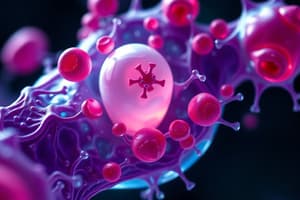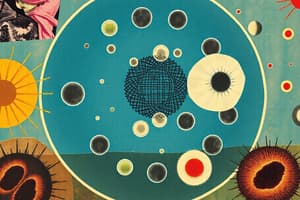Podcast
Questions and Answers
What is the function of the mitochondria in a cell?
What is the function of the mitochondria in a cell?
- Protein synthesis
- Cell signaling
- Waste management
- Energy generation (correct)
What is the term for the process of cell division that results in two daughter cells with identical DNA?
What is the term for the process of cell division that results in two daughter cells with identical DNA?
- Meiosis
- Cytokinesis
- Mitosis (correct)
- Interphase
What is the function of the lysosomes in a cell?
What is the function of the lysosomes in a cell?
- Cell signaling
- Waste management (correct)
- Energy generation
- Protein synthesis
What is the term for cells that lack a true nucleus?
What is the term for cells that lack a true nucleus?
What is the function of the Golgi apparatus in a cell?
What is the function of the Golgi apparatus in a cell?
What is the term for the process of cell growth, division, and differentiation?
What is the term for the process of cell growth, division, and differentiation?
What is the term for the network of membranous tubules and cisternae involved in protein synthesis and transport?
What is the term for the network of membranous tubules and cisternae involved in protein synthesis and transport?
What is the term for the process of cell division that results in four daughter cells with half the DNA of the parent cell?
What is the term for the process of cell division that results in four daughter cells with half the DNA of the parent cell?
What is the primary function of the plasma membrane?
What is the primary function of the plasma membrane?
Which organelle is responsible for protein synthesis?
Which organelle is responsible for protein synthesis?
What is the main difference between prokaryotic and eukaryotic cells?
What is the main difference between prokaryotic and eukaryotic cells?
What is the process by which cells convert light energy into chemical energy?
What is the process by which cells convert light energy into chemical energy?
What is the term for the movement of molecules across the cell membrane without energy input?
What is the term for the movement of molecules across the cell membrane without energy input?
Which cellular process involves the conversion of energy and nutrients to sustain life?
Which cellular process involves the conversion of energy and nutrients to sustain life?
What is the function of the endoplasmic reticulum?
What is the function of the endoplasmic reticulum?
What is the term for the communication between cells through signaling molecules and receptors?
What is the term for the communication between cells through signaling molecules and receptors?
Flashcards are hidden until you start studying
Study Notes
Cell Structure
- Plasma Membrane: Semi-permeable membrane that separates the cell from its environment
- Cytoplasm: Jelly-like substance inside the cell where metabolic processes take place
- Nucleus: Control center of the cell where DNA is stored
- Mitochondria: Organelles responsible for generating energy for the cell through cellular respiration
- Endoplasmic Reticulum (ER): Network of membranous tubules and cisternae involved in protein synthesis and transport
- Ribosomes: Small organelles found throughout the cytoplasm where protein synthesis occurs
- Lysosomes: Membrane-bound sacs containing digestive enzymes that break down and recycle cellular waste
- Golgi Apparatus: Complex of flattened sacs and tubules involved in protein modification and transport
Cell Functions
- Metabolism: Chemical reactions that occur within the cell to maintain life
- Growth and Development: Cells grow, divide, and differentiate to form tissues and organs
- Response to Stimuli: Cells respond to changes in their environment through signaling pathways
- Reproduction: Cells divide to produce new cells through mitosis or meiosis
- Waste Management: Cells remove waste products through exocytosis and autophagy
Cell Types
- Prokaryotic Cells: Lack a true nucleus, found in bacteria and archaea
- Eukaryotic Cells: Possess a true nucleus, found in plants, animals, fungi, and protists
- Stem Cells: Undifferentiated cells that can differentiate into specialized cells
Cell Cycle
- Interphase: Cell grows, replicates its DNA, and prepares for cell division
- Mitosis: Process of cell division that results in two daughter cells with identical DNA
- Cytokinesis: Division of the cytoplasm to form two daughter cells
Cell Structure and Function
- Cell membrane: Separates the cell from its environment, semi-permeable, and allows selective passage of molecules.
- Cytoplasm: Jelly-like substance inside the cell where metabolic processes, such as glycolysis, take place; maintains cell shape and provides mechanical support.
- Nucleus: Control center of the cell, stores DNA, and regulates gene expression.
Cellular Organelles
- Mitochondria: Generates energy for the cell through cellular respiration, converting glucose into ATP.
- Endoplasmic Reticulum (ER): Involved in protein synthesis, lipid synthesis, and detoxification; has two types: rough ER (with ribosomes) and smooth ER (without ribosomes).
- Ribosomes: Sites of protein synthesis, found throughout the cytoplasm, and composed of rRNA and proteins.
- Lysosomes:Membrane-bound sacs containing digestive enzymes, responsible for cellular digestion and recycling.
- Golgi Apparatus: Modifies and transports proteins and lipids, forming vesicles for secretion or lysosomal degradation.
Cellular Activities
- Metabolic Pathways: Chemical reactions that occur within the cell to maintain life, including glycolysis, citric acid cycle, and electron transport chain.
- Cell Growth and Development: Involves cell growth, division, and differentiation, leading to tissue and organ formation.
- Cell Signaling: Cells respond to stimuli through signaling pathways, which involve receptors, signal transduction, and effectors.
- Cell Division: Involves mitosis (division of the nucleus) and cytokinesis (division of the cytoplasm).
- Waste Management: Cells remove waste products through exocytosis (removing excess substances) and autophagy (recycling cellular components).
Cell Types and Cell Cycle
- Prokaryotic Cells: Lack a true nucleus, have a single circular chromosome, and are found in bacteria and archaea.
- Eukaryotic Cells: Possess a true nucleus, have linear chromosomes, and are found in plants, animals, fungi, and protists.
- Stem Cells: Undifferentiated cells that can differentiate into specialized cells, maintaining tissue homeostasis.
- Interphase: Cell grows, replicates its DNA, and prepares for cell division.
- Mitosis: Consists of prophase, metaphase, anaphase, and telophase, resulting in two daughter cells with identical DNA.
Cell Structure
- The plasma membrane is semi-permeable, regulating what enters and leaves the cell.
- Cytoplasm is a jelly-like substance inside the cell membrane where metabolic processes occur.
- The nucleus is the control center of the cell, containing most of the cell's genetic material (DNA).
- Mitochondria produce energy for the cell through cellular respiration.
- The Endoplasmic Reticulum (ER) is a network of membranous tubules and cisternae involved in protein synthesis, transport, and storage.
- Ribosomes are small organelles found throughout the cytoplasm, responsible for protein synthesis.
- Lysosomes contain digestive enzymes, breaking down and recycling cellular waste and foreign substances.
- The Golgi Apparatus is a complex of flattened sacs and tubules involved in protein modification, sorting, and packaging.
Cell Types
- Prokaryotic cells lack a true nucleus and membrane-bound organelles, and are typically found in bacteria.
- Eukaryotic cells possess a true nucleus and membrane-bound organelles, and are typically found in plants, animals, and fungi.
Cellular Processes
- Metabolism is the conversion of energy and nutrients to sustain life.
- Cell division involves the growth, replication, and division of cells through mitosis and meiosis.
- Photosynthesis is the process by which plants and some other organisms convert light energy into chemical energy.
Cell Membrane Functions
- Passive transport is the movement of molecules across the cell membrane without energy input, including diffusion and osmosis.
- Active transport is the movement of molecules across the cell membrane requiring energy input, including pumps and transport proteins.
- Cell signaling is the communication between cells through signaling molecules and receptors.
Studying That Suits You
Use AI to generate personalized quizzes and flashcards to suit your learning preferences.




